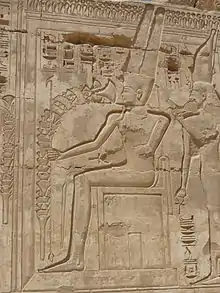jmn
Egyptian
Pronunciation
- (modern Egyptological) IPA(key): /imɛn/
- Conventional anglicization: amen
For the proper noun:
- (reconstructed) IPA(key): /jaˈmaːnuw/ → /jaˈmaːnuw/ → /ʔaˈmaːnəʔ/ → /ʔaˈmoːn/
Verb
3-lit.
Inflection
Conjugation of jmn (triliteral / 3-lit. / 3rad.) — base stem: jmn, geminated stem: jmnn
| infinitival forms | imperative | |||
|---|---|---|---|---|
| infinitive | negatival complement | complementary infinitive1 | singular | plural |
| jmn |
jmnw, jmn |
jmnt |
jmn |
jmn |
| ‘pseudoverbal’ forms | |||
|---|---|---|---|
| stative stem | periphrastic imperfective2 | periphrastic prospective2 | |
| jmn |
ḥr jmn |
m jmn |
r jmn |
| suffix conjugation | |||||
|---|---|---|---|---|---|
| aspect / mood | active | passive | contingent | ||
| aspect / mood | active | passive | |||
| perfect | jmn.n |
jmnw, jmn |
consecutive | jmn.jn |
active + .tj1, .tw2 |
| active + .tj1, .tw2 | |||||
| terminative | jmnt | ||||
| perfective3 | jmn |
active + .tj1, .tw2 |
obligative1 | jmn.ḫr |
active + .tj1, .tw2 |
| imperfective | jmn |
active + .tj1, .tw2 | |||
| prospective3 | jmn |
jmnn |
potentialis1 | jmn.kꜣ |
active + .tj1, .tw2 |
| active + .tj1, .tw2 | |||||
| subjunctive | jmn |
active + .tj1, .tw2 | |||
| verbal adjectives | ||||
|---|---|---|---|---|
| aspect / mood | relative (incl. nominal / emphatic) forms | participles | ||
| active | passive | active | passive | |
| perfect | jmn.n |
active + .tj1, .tw2 |
— | — |
| perfective | jmn |
active + .tj1, .tw2 |
jmn |
jmn, jmnw5, jmny5 |
| imperfective | jmn, jmny, jmnw5 |
active + .tj1, .tw2 |
jmn, jmnj6, jmny6 |
jmn, jmnw5 |
| prospective | jmn, jmntj7 |
— | jmntj4, jmnt4 | |
| ||||
Alternative forms
Alternative hieroglyphic writings of jmn
| jmn | jmn | jmn | jmn | jmn | jmn |
Derived terms
Inflection
Declension of jmn (perfective active participle)
Proper noun

m
Alternative forms
Alternative hieroglyphic writings of jmn
| jmn | jmn | jmn | jmn | jmnw | jmn |
Derived terms
- jmn m jpt (“Amun of Luxor”)
- jmn m jpt-swt (“Amun of Karnak”)
- jmn nb nswt tꜣwj (“Amun, Lord of the King of Egypt”)
- jmn-ms
- jmn-rꜥ (“Amun-Ra”)
- jmn-rꜥ nswt nṯrw (“Amun-Ra, King of the gods”)
- jmn-rn (“a minor deity”)
- jmn-ḥtp (“Amenhotep, deified scribe and architect”)
- jmnt (“Amunet”)
- ꜥnḫ.s-n-jmn
- mry-jmn
- mryt-jmn
- rwḏ-jmn
- zꜣ-jmn
- tꜣ-nt-jmn
- tꜣnwꜣtj-jmn
- twt-ꜥnḫ-jmn
- twt-ꜥnḫ-jmn-ḥqꜣ-jwnw-šmꜥw
- ḏḏt-jmn
Descendants
Etymology 2
From Proto-Afroasiatic *yamin-. Cognate with Proto-Semitic *yamīn- (“right”).
Pronunciation
- (reconstructed) IPA(key): /jaˈmiːnij/ → /jaˈmiːnij/ → /ʔaˈmiːn/
- (modern Egyptological) IPA(key): /imɛn/
- Conventional anglicization: amen
Inflection
Declension of jmn (perfective active participle)
Alternative forms
Alternative hieroglyphic writings of jmn
| jmn | jmn | jmn |
Synonyms
Derived terms
References
- James P[eter] Allen (2010) Middle Egyptian: An Introduction to the Language and Culture of Hieroglyphs, 2nd edition, Cambridge: Cambridge University Press, →ISBN, 280 page 186, 280.
- Erman, Adolf; Grapow, Hermann (1926) Wörterbuch der ägyptischen Sprache, volume 1, Berlin: Akademie-Verlag, →ISBN, page 83.4–83.6, 83.12–84.7, 84.15–85.2
- Faulkner, Raymond (1962) A Concise Dictionary of Middle Egyptian, Oxford: Griffith Institute, →ISBN, page 21
- Schenkel, Wolfgang (1990) Einführung in die altägyptische Sprachwissenschaft, page 89
This article is issued from Wiktionary. The text is licensed under Creative Commons - Attribution - Sharealike. Additional terms may apply for the media files.